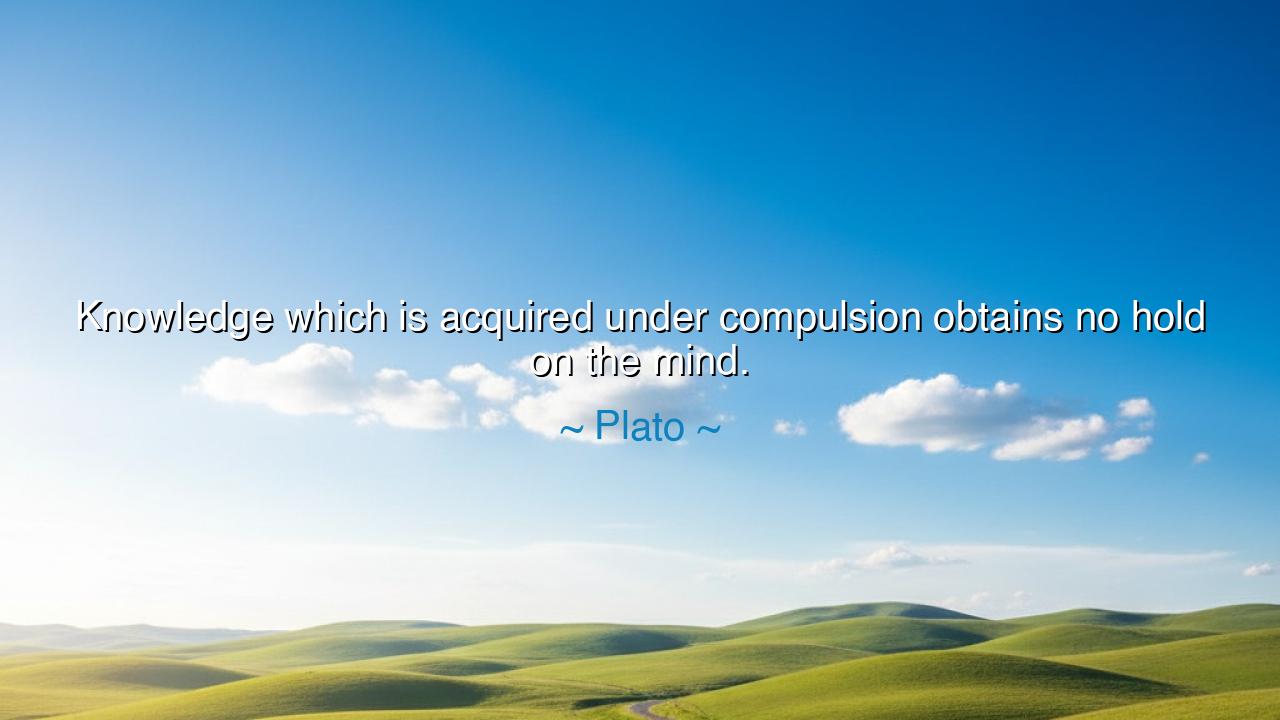
Knowledge which is acquired under compulsion obtains no hold on






Hear the immortal words of Plato, the philosopher of Athens and student of Socrates: “Knowledge which is acquired under compulsion obtains no hold on the mind.” In this saying lies the secret of true learning, the difference between wisdom that is alive and memorization that is dead. For when the heart is forced, it resists; when the soul is compelled, it closes its doors. But when the mind hungers freely, when the spirit thirsts willingly, then knowledge takes root, grows deep, and bears fruit that endures.
The ancients knew this truth well. Socrates himself never forced his teaching upon others; he asked questions, stirred curiosity, and awakened thought. His method was not the rod but the spark, not compulsion but invitation. For he knew that a truth pressed upon unwilling ears slips away like water through a clenched fist. But truth sought freely sinks into the depths of the mind, where it cannot be uprooted.
Consider the tale of the young Alexander, taught by Aristotle. Though a prince, he did not sit in resentment at his lessons. He desired to know, to grasp the mysteries of philosophy, poetry, and science. His knowledge, freely embraced, became part of his very being, shaping him into a conqueror not only of lands but of ideas. Compare this to countless students in every age who are beaten into study by fear of punishment—their learning is shallow, forgotten once the pressure lifts, for it never touched the heart.
History gives us further testimony. In the Middle Ages, many were forced to memorize sacred texts without understanding. They repeated words like machines, yet their lives bore little wisdom. By contrast, when Gutenberg’s press spread books to eager hands, people learned by choice, and Europe awoke in the Renaissance. What was imposed by compulsion soon vanished; what was sought with freedom ignited revolutions of thought and art.
Plato’s wisdom is also a warning to rulers, teachers, and parents: do not mistake obedience for understanding. You may fill a head with facts by force, but you cannot make the mind embrace them. True education is not the molding of clay, but the nurturing of a flame. To compel is to plant seeds in barren soil; to inspire is to plant in fertile ground, where roots grow strong.
The lesson, then, is clear: if you wish to learn, seek knowledge with love, not fear. And if you wish to teach, awaken desire, not dread. Let curiosity be the guide, for the mind remembers best what the heart desires. A single lesson embraced freely is worth more than a thousand forced upon unwilling souls.
What must you do? Cultivate your own thirst for truth. Do not study only because others demand it, but because your soul longs to grow. Ask questions, explore, seek connections, and let learning become joy, not burden. And when you teach, whether a child, a student, or a friend, kindle their curiosity instead of chaining them with fear. For in this way, knowledge will not merely pass through them, but remain within them as treasure eternal.
Thus remember Plato’s words: “Knowledge which is acquired under compulsion obtains no hold on the mind.” To learn is not to be forced—it is to be awakened. And the awakened soul, once touched by truth, carries it forever, as a flame that no darkness can extinguish.






AAdministratorAdministrator
Welcome, honored guests. Please leave a comment, we will respond soon